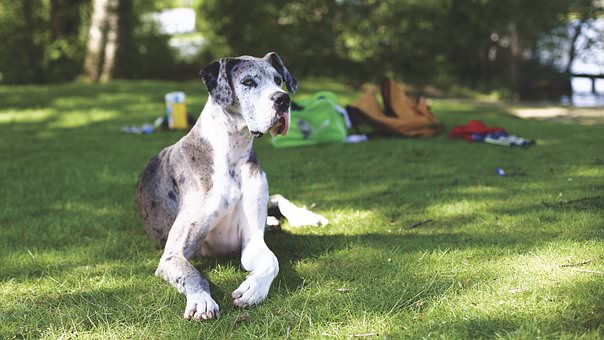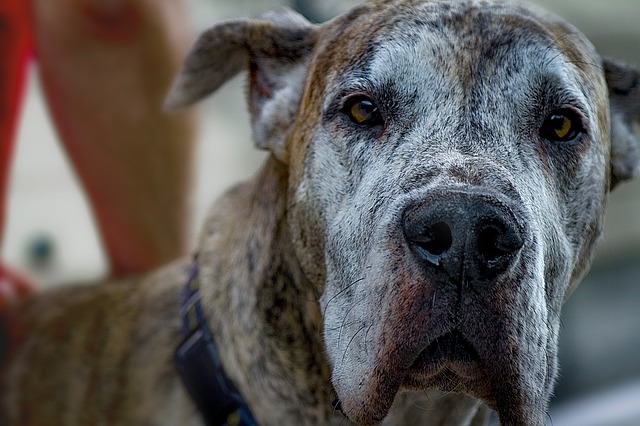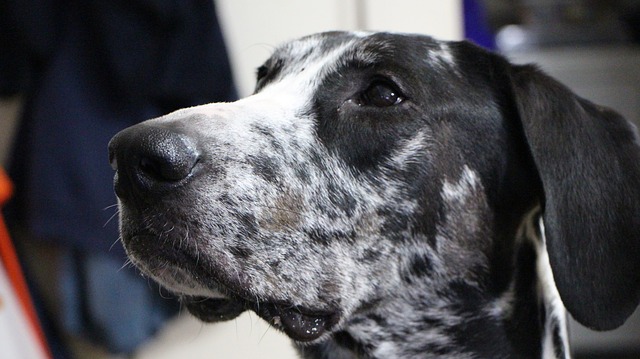Great Danes are gorgeous and remarkable. They are stoic and kind. However, they do seem to be predisposed to certain issues, of which owners should be aware.
Certain diseases seem to crop up more often in certain types of dogs. These are known as breed associated disorders. Each type of dog has its own list, but many of the issues are shared by multiple breeds and very few of these types of issues are exclusive to a single breed. Great Danes are close to my heart because I shared my home with a rescued one for almost 12 years.

Three particular groups of issues come to my mind when I think of Danes and their health.
Orthopedic Issues
Orthopedic issues include trouble with bones and joints. Hip Dysplasia and Osteoarthritis are common problems in Great Danes and Dane crosses. The hip joint is a ball and socket joint and hip dysplasia causes malformation of the components leading to instability. There can be abnormalities in either the ball or the socket (or both) and the chronic laxity causes abnormal wear and leads to osteoarthritis. There is a strong genetic correlation for hip dysplasia in certain breeds, and giant breeds are among them. The symptoms in affected dogs can be managed, but most cases require lifelong treatment. You need your vet’s help to find out if these issues are a problem for your dog. There are medications and strategies to help.
Gastrointestinal Disease
For Dane lovers, the most devastating and frightening GI disorder is Gastric dilatation-volvulus (GDV). GDV, or bloat, is a progressive life-threatening issue that occurs when the stomach bloats and then twists on itself. Even the bloat alone (the “dilatation” part of GDV) is damaging because the pressure can cause cells to die. But when the stomach becomes so dilated that it twists, the blood supply to portions of the stomach is cut off and the tissues start to die. Affected dogs progress rapidly into shock and die if immediate intervention is not instituted. Great Danes all have deep chests which allow more room for the stomach to rotate and studies show that those at greatest risk are often genetically related to other affected dogs. If you have a Great Dane, especially with family members who have bloated, ask your vet about options to protect your dog.

Heart Disease
Heart disease can affect any breed of dog, but Great Danes have a specific kind of heart disease that is breed-associated called Dilated Cardiomyopathy (DCM). In this disease, the muscular walls of the heart become thin and less able to pump blood as they should. Affected dogs progress to cardiac failure and eventually die from the disorder. This is a genetic tendency and is considered a breed-associated issue for Danes. Dogs with early DCM show little to no obvious clinical signs until they progress to cardiac failure.
If you have a normal Great Dane, you might elect to have routine electrocardiograms performed for your dog as a part of his wellness. Sometimes subtle electrical disturbances will show themselves to your veterinarian while the disease is still nonclinical. Good breeders will choose to never breed DCM affected dogs, but sometimes they will not know prior to breeding the dog, so careful screening is a part of responsible breeding practices.

What Can You Do?
Be observant of what is normal for your dog. Any change must be reported to your veterinarian. Remember, you know your dog the best. If you think he is in pain or not his normal self, you are probably right. If you are looking to adopt a Great Dane puppy, ask questions about his parentage and ask to see them. Good breeders welcome prospective owners into their facility and have nothing to hide. Find out if the parents have been certified to have good hips and elbows by the Orthopedic Foundation for Animals. Find out what your own veterinarian suggests about safely feeding and managing risk of GDV and ask if he/she recommends routine EKG screening or echocardiogram for Great Danes. But most of all, enjoy your Dane for all the love and fun she can offer!
Do you love dogs and want to learn more about them? Follow me on Facebook by clicking here.
